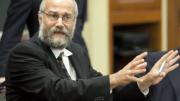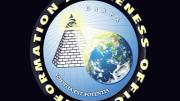Yochai Benkler, Berkman professor for entrepreneurial legal studies at Harvard Law School, spoke on December 4 about the President’s Surveillance Program (PSP, a collection of U.S. secret intelligence activities) and Edward Snowden in a talk entitled “System and Conscience: NSA Bulk Surveillance and the Problem of Freedom.” The venue was the weekly seminar sponsored by Harvard’s Center for Research in Computation and Society (CRCS), which brings computer scientists together with economists, psychologists, legal scholars, ethicists, neuroscientists, and other academic colleagues to address fundamental cross-disciplinary computational problems that face society.
Benkler presented a theoretical framework for thinking about how to balance security and freedom in a liberal democratic society (he is himself an Israeli American, raised in Israel). He opened with a slide of the logo of the Information Awareness Office (see image gallery above) of DARPA (the Defense Advanced Research Projects Administration): it depicts the all-seeing eye atop a pyramid (the familiar image from the U.S. dollar bill), projecting the eye’s visual omniscience onto the globe. “This captures the idea that observation is power,” he said.
The idea behind allowing security agencies (the NSA and the FBI, in this case) to “see” everything is not only that it might allow the government to prevent terrorist attacks before they happen, but also that it might act as a deterrent: knowing that they are being watched, terrorists will be less likely to act. But what effect, Benkler asked, does this have on society at large? The post-Snowden revelations of bulk surveillance of the communications metadata of American citizens can have the unintended consequence of changing behavior across the entire fabric of society. Just the assumption that “someone might be listening,” he pointed out, has the power to change the behavior of ordinary people. And that self-regulation, the consequence of projecting power through observation, is fundamentally a curtailment of freedom.
Benkler then gave a short history of U.S. secret intelligence programs. He cited the 1976 Church Committee report on foreign and military intelligence as a document that “bought us 25 years of security” and freedom in balance with each other. (The committee, precursor to the Senate intelligence committee, was formed to guard against the “total tyranny” that would ensue should broad surveillance power fall into “the hands of a dictator,” as committee chair Senator Frank Church (D-ID) put it after the Watergate investigation revealed illegal intelligence gathering.) But changing technology (the vastly increased ability to collect and mine useful data) and the 9/11 attacks, Benkler said, have conspired to destabilize that equilibrium.
Benkler placed the blame for overreaching by the NSA and, equally, the FBI, less on individuals than on the failure of human systems. The government’s use of surveillance has been deeply reliant on institutional and organizational mechanisms to control its intelligence-gathering power. Such systems are inevitably imperfect, he said. He then traced the expansion of the PSP from its inception, with the legal blessing of then deputy assistant attorney John Yoo ’89 (whom U.S. attorney general Alberto Gonzales J.D. ’82, and assistant attorney general Jay Bybee later said had acted alone and without their knowledge) to the present. Once the program had begun, internal attempts to check it by questioning its purported legality proved ineffectual. Benkler described how, in the next phase of expansion, “jurisdictional arbitrage” allowed the program to grow from a focus on foreign nationals to eventually encompass any communication to, from, or about a foreign subject. He described the cooperation of telephone companies (with the lone exception of Qwest) and, less willingly, of Internet companies, with government requests for data. And he detailed the failure of the secret courts tasked with overseeing the program to do so effectively. In several instances, the courts noted, they learned of the program’s full scope only in retrospect. As further evidence of secret courts’ inability to check the actions of the executive branch, Benkler pointed to a recent ruling of a FISA court that used the fact that no company had ever used legal channels to resist the government’s demands for the metadata of American citizens as a justification for letting the practice continue.
As for congressional oversight—a check on such surveillance by the legislative branch—Benkler showed a slide of a U.S. representative with a quote saying that it was “a joke,” because he learned more about surveillance practices from the newspaper than from any classified briefing.
Benkler then addressed the question of whether such programs actually improve security. Although the government once claimed that it had uncovered 54 instances of terrorist activity, Benkler says those claims have now been reduced to one: a series of transfers of a total of $8,500 to a terrorist organization. This revelation has undermined the use of terrorism as a justification for the construction of the NSA’s $2-billion data center. “The NSA now says it is focusing on cybersecurity,” he noted.
Finally, Benkler addressed the ability of individuals like Edward Snowden to restore balance to the competing interests of security and freedom. Systems for preserving both are imperfect, he acknowledged, and there is “no single system for preserving freedom.” But he pressed for a more encompassing understanding of the legitimate checks on the power of the government’s executive branch. The spectrum, from internal checks, to legal checks, to legislative checks, should also include acts of conscience by individuals, he argued. Although he left open the question of whether Snowden went too far in revealing details of the PSP, Benkler said he believes that Snowden is a person of conscience who understood that he was taking a huge risk and engaged in deep act of self-sacrifice. Benkler therefore rejected the idea that Snowden is guilty of treason. He wasn’t “taking it to the enemy,” he says. Because of secrecy combined with a sense of emergency, “the [surveillance oversight] system hasn’t been working” he concluded. Snowden exposed that. Predicted Benkler, “He will be a major historical figure.”










